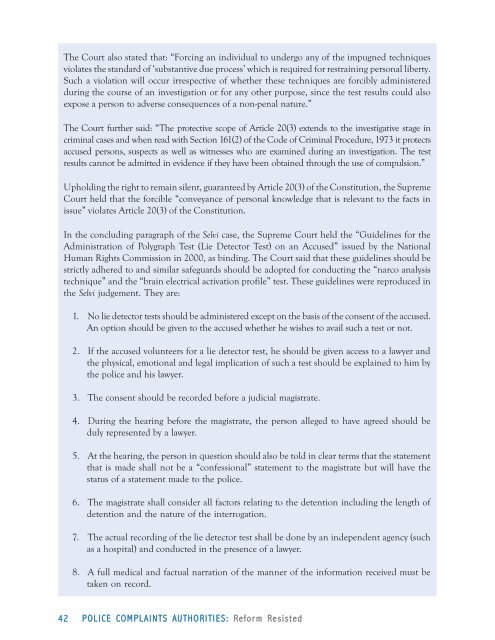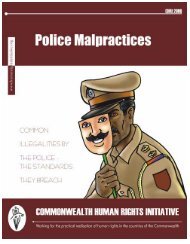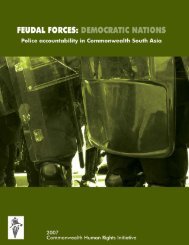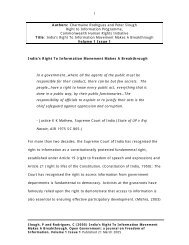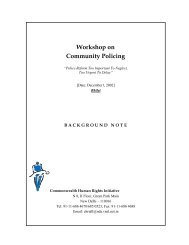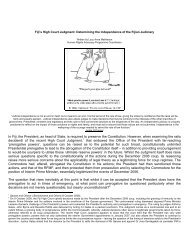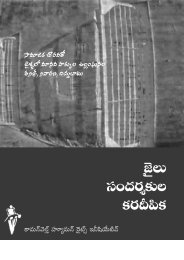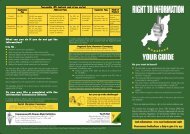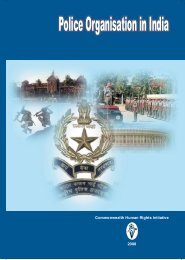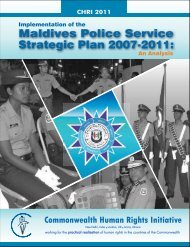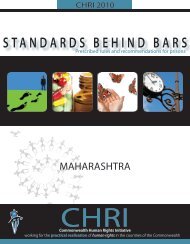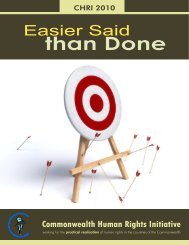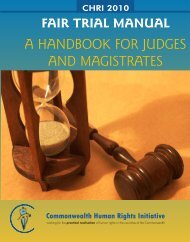Police Complaints Authorities: Reform Resisted - Commonwealth ...
Police Complaints Authorities: Reform Resisted - Commonwealth ...
Police Complaints Authorities: Reform Resisted - Commonwealth ...
You also want an ePaper? Increase the reach of your titles
YUMPU automatically turns print PDFs into web optimized ePapers that Google loves.
The Court also stated that: “Forcing an individual to undergo any of the impugned techniquesviolates the standard of ‘substantive due process’ which is required for restraining personal liberty.Such a violation will occur irrespective of whether these techniques are forcibly administeredduring the course of an investigation or for any other purpose, since the test results could alsoexpose a person to adverse consequences of a non-penal nature.”The Court further said: “The protective scope of Article 20(3) extends to the investigative stage incriminal cases and when read with Section 161(2) of the Code of Criminal Procedure, 1973 it protectsaccused persons, suspects as well as witnesses who are examined during an investigation. The testresults cannot be admitted in evidence if they have been obtained through the use of compulsion.”Upholding the right to remain silent, guaranteed by Article 20(3) of the Constitution, the SupremeCourt held that the forcible “conveyance of personal knowledge that is relevant to the facts inissue” violates Article 20(3) of the Constitution.In the concluding paragraph of the Selvi case, the Supreme Court held the “Guidelines for theAdministration of Polygraph Test (Lie Detector Test) on an Accused” issued by the NationalHuman Rights Commission in 2000, as binding. The Court said that these guidelines should bestrictly adhered to and similar safeguards should be adopted for conducting the “narco analysistechnique” and the “brain electrical activation profile” test. These guidelines were reproduced inthe Selvi judgement. They are:1. No lie detector tests should be administered except on the basis of the consent of the accused.An option should be given to the accused whether he wishes to avail such a test or not.2. If the accused volunteers for a lie detector test, he should be given access to a lawyer andthe physical, emotional and legal implication of such a test should be explained to him bythe police and his lawyer.3. The consent should be recorded before a judicial magistrate.4. During the hearing before the magistrate, the person alleged to have agreed should beduly represented by a lawyer.5. At the hearing, the person in question should also be told in clear terms that the statementthat is made shall not be a “confessional” statement to the magistrate but will have thestatus of a statement made to the police.6. The magistrate shall consider all factors relating to the detention including the length ofdetention and the nature of the interrogation.7. The actual recording of the lie detector test shall be done by an independent agency (suchas a hospital) and conducted in the presence of a lawyer.8. A full medical and factual narration of the manner of the information received must betaken on record.4 2 PO L I CE CO M PL A I N TS AU TH O R I TI E S : Re fo r m Re si st ed


